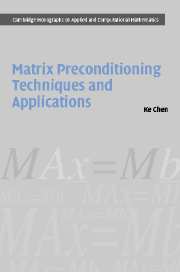Book contents
- Frontmatter
- Contents
- Preface
- Nomenclature
- 1 Introduction
- 2 Direct methods
- 3 Iterative methods
- 4 Matrix splitting preconditioners [T1]: direct approximation of An×n
- 5 Approximate inverse preconditioners [T2]: direct approximation of An×n−1
- 6 Multilevel methods and preconditioners [T3]: coarse grid approximation
- 7 Multilevel recursive Schur complements preconditioners [T4]
- 8 Sparse wavelet preconditioners [T5]: approximation of Ãn×n and Ãn×n−1
- 9 Wavelet Schur preconditioners [T6]
- 10 Implicit wavelet preconditioners [T7]
- 11 Application I: acoustic scattering modelling
- 12 Application II: coupled matrix problems
- 13 Application III: image restoration and inverse problems
- 14 Application IV: voltage stability in electrical power systems
- 15 Parallel computing by examples
- Appendix A a brief guide to linear algebra
- Appendix B the Harwell–Boeing (HB) data format
- Appendix C a brief guide to MATLAB®
- Appendix D list of supplied M-files and programs
- Appendix E list of selected scientific resources on Internet
- References
- Author Index
- Subject Index
- Plate section
3 - Iterative methods
Published online by Cambridge University Press: 06 January 2010
- Frontmatter
- Contents
- Preface
- Nomenclature
- 1 Introduction
- 2 Direct methods
- 3 Iterative methods
- 4 Matrix splitting preconditioners [T1]: direct approximation of An×n
- 5 Approximate inverse preconditioners [T2]: direct approximation of An×n−1
- 6 Multilevel methods and preconditioners [T3]: coarse grid approximation
- 7 Multilevel recursive Schur complements preconditioners [T4]
- 8 Sparse wavelet preconditioners [T5]: approximation of Ãn×n and Ãn×n−1
- 9 Wavelet Schur preconditioners [T6]
- 10 Implicit wavelet preconditioners [T7]
- 11 Application I: acoustic scattering modelling
- 12 Application II: coupled matrix problems
- 13 Application III: image restoration and inverse problems
- 14 Application IV: voltage stability in electrical power systems
- 15 Parallel computing by examples
- Appendix A a brief guide to linear algebra
- Appendix B the Harwell–Boeing (HB) data format
- Appendix C a brief guide to MATLAB®
- Appendix D list of supplied M-files and programs
- Appendix E list of selected scientific resources on Internet
- References
- Author Index
- Subject Index
- Plate section
Summary
As we will see, iterative methods are not only great fun to play with and interesting objects for analysis, but they are really useful in many situations. For truly large problems they may sometimes offer the only way towards a solution.
Henk A. van der Vorst. Iterative Krylov Methods for Large Linear Systems. Cambridge University Press (2003)A similar work [on the fast multipole method]was done in 3D by Rokhlin. As in 2D, the multistep algorithm was not properly explained.
Eric Darve. Fast Multipole Method, preprint, Paris, France (1997)An iterative method for linear system Ax = b finds an infinite sequence of approximate solutions x(j) to the exact answer x*, each ideally with a decreased error, by using A repeatedly and without modifying it. The saving from using an iterative method lies in a hopefully early termination of the sequence as most practical applications are only interested in finding a solution x close enough to x*. Therefore, it almost goes without saying that the essence of an iterative method is fast convergence or at least convergence. When this is not possible for (1.1), we shall consider (1.2) with a suitable M.
This chapter will review a selection of iterative methods for later use as building blocks for preconditioner designs and testing.
- Type
- Chapter
- Information
- Matrix Preconditioning Techniques and Applications , pp. 110 - 164Publisher: Cambridge University PressPrint publication year: 2005
- 1
- Cited by



